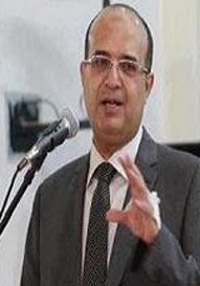By Umar Khan.
Tripoli, 7 September:
The future prime minister of Libya will be decided in less than a week from among the eight candidates who have been nominated for the post. However, it is widely believed the real contest will be between the three front-runners – those with largest number of supporters in the General National Congress. The present electricity minister, Awad Barasi, is one strong contender whilst the other two are former prime minister Mahmoud Jibril and the present deputy prime minister Mustafa Abushagur.
Awad Barasi spoke to the Libya Herald about his candidacy, his work as the electricity minister and the ongoing standoff within the Islamist circles over his involvement with the Muslim Brotherhood (MB).
Barasi and Jibril represent two very different groups within the Congress. Barasi is a member of the Muslim Brotherhood-linked Justice and Construction Party (J&C) whilst Jibril is the head of the National Forces Alliance. Abushagur has emerged as a compromise candidate because of the divisions within the congress members, thus making the competition between the three even more tough.
Barasi, who graduated from the University of British Columbia, Canada, was serving as the vice president of DEWA, Dubai Electricity and Water Authority before he made his way back to Libya during the revolution last year. He says: “After changing the flag at the Libyan embassy last year, we started doing our bit in taking care of the refugees in Tunisia and worked in the relief aid till the executive office was formed.”
After being aksed to head the electricity sector of Libya in the executive office, he started working in May last year under Mahmoud Jibril. “I immediately came to Libya in May to start work and at the same time co-founded the ‘Libyan Media Observatory’ which translated all the news reports in the international media into Arabic and forwarded it to relevant departments and decision-makers to take note.”
Following the liberation of Tripoli, Barasi was approached by the National Transitional Council members from Tripoli who wanted to nominate him as the prime minister of the interim government but he refused, in order to keep working in the same field. “I refused because I wanted to take the work forward that I had already started. Later I was made Minister of Electricity & Renewable Energy and Abdurrahim El-Kib was made prime minister.”
Barasi is one of the few people to have worked in the same sector since the NTC started to function in what was, at that time, free Libya. He has since made some major changes in the system and structure of the ministry. It is caid that it is the only ministry to have actually implemented de-centralisation. “There was a lot to do in this sector. The corruption was an epidemic. The working structure was made to be unproductive. Everything was centralised, they had to go thorough Tripoli.”
Asked how he introduced de-centralisation in the ministry, Barasi says: “Libya is divided into six regions in terms of the electricity but everything was centralised and controlled from Tripoli. We empowered the local regions, gave them authority to make decisions on everything like human resources, finance, legal, purchasing and the like. Now they’re independent.”
Barasi prides himself on fighting the corruption from the first day he took the office. He says he has been threatened on several occasions by armed men for removing corrupt people. “The whole structure was faulty. GECOL (General Electric Company of Libya) was in charge of everything. They had what was called the companies of GECOL which they would hire to do their own work. So, GECOL itself was the owner, consultant and the contractor. They couldn’t refuse any offer and the corruption was widespread.”
“What I did was to remove the companies from the GECOL and put them under the ministry. So now GECOL is the client, they evaluate different offers and decide on merit,” He continues: “I also changed the board of directors of all the companies under the ministry with honest people. We put a certain criteria and brought people from different regions of Libya to serve on the board of directors.” He also adds with a smile, “Now, because of these strict actions against corruption, I also have a lot of enemies”.
Speaking about the nationwide power cuts, Barasi says the shortages are not new to Libya but in the old days the power cuts were done, mostly, in the smaller cities. Many new power projects were started by the former regime, he says, but they were not completed when the revolution started last year. The situation is compounded by the fact that some companies are still reluctant to return to work because of sporadic and random clashes while the interim government struggles to restore security on the streets.
“There are three projects of 250 MW each, in advanced stages, but the companies have so far refused to return because of the security situation. The same applies to the overhauling of two plants of about 160 MW each. They are not producing any electricity. Again the company is afraid to come.” He continues: “Every time they plan to come, some incident happens that delays the visit. They were scheduled to come as recently as 28 August but postponed because of the security situation. Now they will send a team to evaluate the situation, again, before they come here.”
Asked why there is not much information about what the ministry has been doing, he says, “I have personally explained the situation many times on the national TV and it is also available on the website”.
Barasi insists that he learnt about his nomination for the post of Prime Minister from the internet. He was formally asked by the J&C party during Ramadan. He says he initially refused but after performing the Istikhara (a guidance prayer before making a major decision) he agreed to do whatever he could to serve the country.
He thinks that the reason some Salafists and independents are not supporting him or are hesitant about it is because they fear exclusion because of his affiliation with the MB. “I told them to look at my resumé and see what I’ve done in the past. There is no reason to think that as I’m an executive man and the only thing I value is capability. I tend to do everything on merit and not afraid to take decisions.”
Barasi joined the Brotherhood in the 1980s and left Libya after graduating from the University of Benghazi in 1990. He did post-graduation and doctorate from Canada and worked for a couple of years in USA before settling in Dubai. He was approached several times by Saif Al-IslamQaddafi and his aides when they started the initiative to bring back the Libyans settled abroad. He was offered to head the GECOL several times, the latest in 2009 when Imran Bukrah, then Electricity Minister offered him the role. But he refused every time.
After each refusal, Barasi’s says his relatives were threatened and then an investigation was launched against him. He was never involved with any opposition group in the past but was only active in the Libyan and Muslims community while living abroad.
While in Canda, he took out Canadian Citizenship. Asked about it and the GNC ruling that the Prime Minister may not hold dual nationality, he says simply, “I have already started the process to relinquish my other nationality”.
Asked what would be his priority if he is made the prime minister, he says: “I just want to work for the country, no matter in what position. It’s about serving Libya. All my ministers would be appointed only because of their capabilities, qualifications and performance. There will be absolutely no room for corruption. This is something many people don’t like me for, but corruption will simply not be accepted.”
Barasi also stressed that he would have no problem working with any other prime minister if he is asked to continue his work. “We have to respect the decision of the people and my aim is to work for my country and nothing else.”
This is one in a series of articles on the candidates for the post of Prime Minister.
Umar Khan can be found on Twitter at www.twitter.com/umarnkhan [/restrict]



![Libya's Minister of Electricity and Renewable Energy Ibrahim Awad Barasi attends the . . .[restrict]second conference of the Arab-Turkish Industrial Cooperation in Benghazi](http://www.libyaherald.com/wp-content/uploads/2012/09/Barasi-2.jpg)







